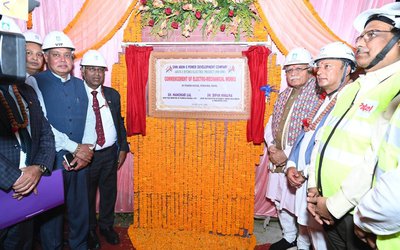
The Department of Customs said that Nepal has imported petroleum products worth Rs. 219 billion in the first nine months of the current fiscal year. Simialrly, Nepal imported crude soybean oil worth Rs. 46.31 billion, crude palm oil worth Rs. 33.23 billion and crude sunflower worth Rs. 16.49 billion during the review period.
Likwise, maize worth Rs. 12.14 billion, paddy and rice worth Rs. 50.7 billion and wheat worth Rs. 5.88 billion have been imported.
Nepal Rastra Bank has already applied measures to tighten the imports of luxurious and non-essential items in an attempt to control the trade deficit.
According to a data released by the department, diesel tops the lists of imported commodity in the first nine months of the current fiscal year. Diesel worth Rs. 105.97 billion has been imported during the period.
Meanwhile, petrol worth Rs. 47.23 billion, liquefied petroleum gas (LPG) worth Rs. 45.34 billion, aviation fuel worth Rs. 9.30 billion, kerosene Rs. 1.07 million, lubricants worth Rs. 4.90 billion and petroleum bitumen worth Rs. 6.27 billion have been imported during the period.
Nepal also imported worth of over Rs.50 billion to import vehicles of various kinds.
The data published by the department has shown that the country’s trade deficit has reached whopping Rs. 1,306.08 billion in the first nine months of the current fiscal year 2021/22. Trade deficit of the period is higher by 28.47 per cent than the deficit of the corresponding period last fiscal year. Trade deficit during the same period last year was Rs. 1,016.62 billion.
Despite a significant increase in exports, the country’s trade deficit has widened further during the review period due to low volume of exports compared to the imports.
According to the Foreign Trade Statistics of the Department of Customs, export trade has increased by 69.44 per cent to Rs. 160.57 billion during the first nine months (mid-July 2021 to mid-April 2022) of the current fiscal year. Nepal had exported goods worth Rs. 94.76 billion in the same period last fiscal year.
Meanwhile, imports increased by 31.97 per cent to Rs. 1,466.66 billion during the review period. In the same period last fiscal year, the country had imported goods worth Rs. 1,111.39 billion.
With the increase in exports, its contribution to total trade also increased from 7.86 per cent to 9.87 per cent during the review period. The share of export in the total trade has decreased to 90.13 per cent from 92.14 per cent last year.
According to the statistics, total foreign trade has also increased. The country’s foreign trade volume has reached Rs. 1,627.23 billion during the review period which is 34.91 per cent more than the previous year.
Nepal Rastra Bank has already applied measures to tighten the imports of luxurious and non-essential items in an attempt to control the trade deficit.
Soybean, palm oil major export items
Meanwhile, soybean oil had the largest share in export during the review period. Soybean oil worth Rs. 43.30 billion was exported in the first nine months of the current fiscal year.
Similarly, palm oil has the second largest share after soybean oil. Palm oil worth Rs. 36.37 billion was exported during the review period.
Cardamom worth Rs. 3.85 billion, yarns worth Rs. 9.13 billion, tea and coffee worth Rs. 3 billion, carpet worth Rs. 7 billion and felts worth Rs. 4 billion were exported during the review period.
- Weather To Remain Partly To Generally Cloudy
- Apr 27, 2025
- KOICA Concludes Integrated Rural Development Project Worth 4.7 Million USD
- Apr 25, 2025
- Budget session Of Federal Parliament Begins Today
- Apr 25, 2025
- 10th Memorial Day Of Gorkha Earthquake
- Apr 25, 2025
- Kathmandu's Maximum Temperature Likely To Dip From Sunday
- Apr 25, 2025















